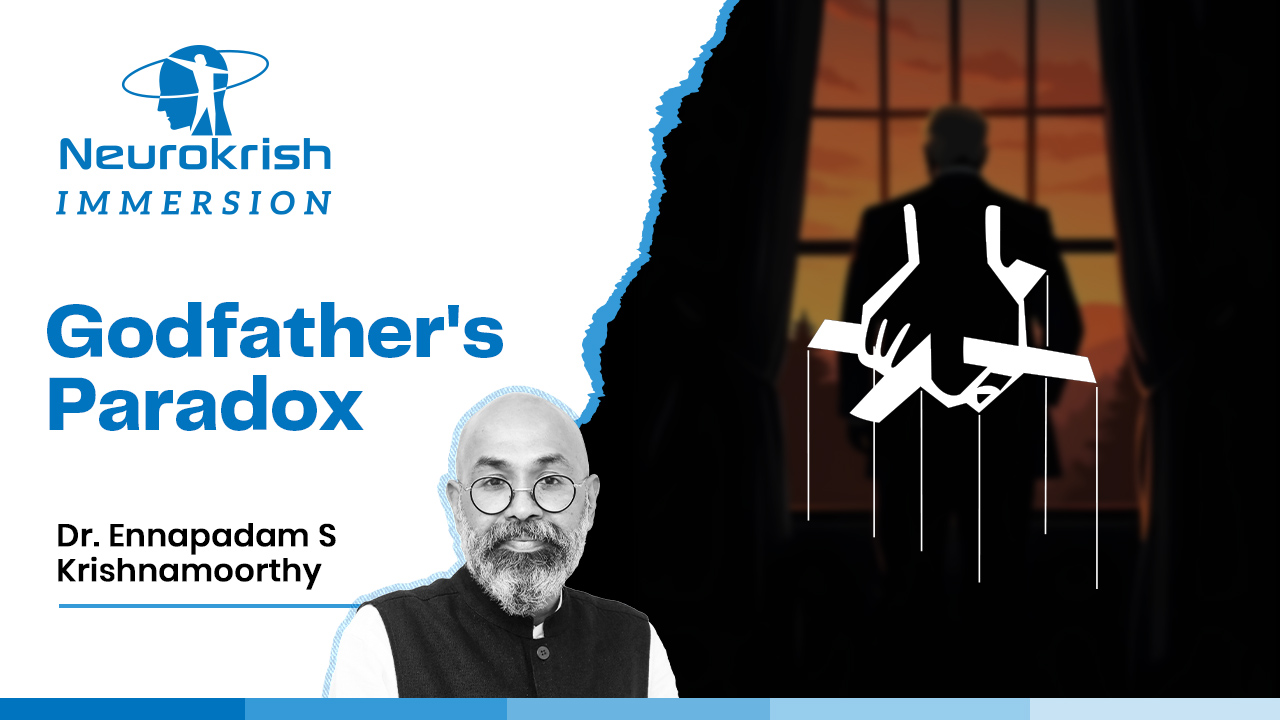By Dr. E.S. Krishnamoorthy
There are few fictional characters as enduring and enigmatic as Mario Puzo’s Godfather. Both the novel and the film adaptation have long fascinated me, not just as a reader or viewer, but as a clinician and neuroscientist. At the heart of this fascination lies a single paradox: how does someone capable of such cold ruthlessness still manage to appear calm, reasonable, and even protective?
Is Vito Corleone a villain or a visionary? A criminal mastermind or a master manipulator of social order? In this blog, we explore what I call The Godfather Paradox, using neuroscience and psychology to unpack what makes a socially enabled psychopath.
Who is the Psychopath?
Let’s begin with the classic clinical picture. A psychopath typically demonstrates:
- A lack of empathy
- A lack of empathy
- Shallow emotional experiences
- Impulsivity and irresponsibility
- Manipulativeness masked by superficial charm
They often live outside societal norms, and their antisocial actions are not tempered by conscience. But what happens when the same traits are channeled into leadership, strategy, and charm? That’s when we meet the functional or socially enabled psychopath.
The Calm Beneath the Storm: Vito Corleone
What sets the Godfather apart is not just his capacity for violence, it is his capacity for reason. Repeatedly described as a “reasonable man,” he is calm, calculating, and never impulsive. He has a strong sense of propriety, insists on decorum, and frowns upon vulgarity. He is meticulous with language and particular about conduct.
Despite his criminal background, he is neither flamboyant nor reactive. He doesn’t charm you the way typical psychopaths might; rather, he commands respect through calculated restraint. He negotiates before he destroys.
And yet, he is capable of tremendous cruelty, such as the infamous horse-head-in-the-bed scene. These stark contrasts are what make him so compelling, and dangerous.
A Functional Psychopath?
The Godfather’s psychopathy is not of the impulsive or reckless kind. It’s methodical. He:
- Seeks control, not chaos
- Manipulates without remorse
- Dispenses favors with the expectation of return
- Operates within his own moral code, not society’s
He exhibits many traits of psychopathy, but channels them toward building an empire, not destroying one. His control over emotions, reading of social cues, and strategic use of power define him as a high-functioning, socially enabled psychopath.
What Does Neuroscience Tell Us?
Let’s take a closer look at the brain. Studies of psychopathy reveal:
- Underactivity in the amygdala (emotional processing center)
- Reduced empathy circuits
- Disconnection between emotion and decision-making areas
This explains the calmness under pressure. When presented with moral dilemmas, like deciding whether to kill one to save five, psychopaths show reduced brain activity in areas associated with emotional conflict. Where most of us agonize, they simply choose.
Bomb disposal experts and astronauts like Neil Armstrong have demonstrated similar patterns, calm under pressure, lowered heart rates in crises. This biological coolness may explain why some psychopaths thrive in high-stakes leadership roles.
Business Leaders, Saints, and Psychopaths: A Shared Spectrum?
Interestingly, research comparing business leaders and criminals has found striking neurological similarities. Both score high in traits like egocentricity, risk-taking, and persuasion. The difference lies in impulse control, goal-setting, and long-term planning.
Even saints and seers, known for stoicism, detachment, and unwavering focus, share some neurological overlaps with psychopaths. The difference? Empathy and altruism. Where the saint is selfless, the psychopath is self-serving.
Modern-Day Parallels: Steve Jobs and the Reality Distortion Field
Perhaps one of the most compelling modern examples is Steve Jobs. Charismatic, obsessive, and capable of reshaping reality itself, he embodied many psychopathic traits. His biography paints a picture of a man with:
- Intense focus
- Reality distortion
- Manipulative charm
- Emotional detachment
He could inspire, dominate, and bulldoze his way through resistance, often without blinking.
Was he a psychopath? Perhaps not clinically. But he certainly straddled that fine line between visionary leadership and emotional manipulation.
The Final Question: Who’s the Odd One Out?
Is it the violent Veerappan, the calculating Godfather, or the creative genius Steve Jobs? All three share a belief in their own version of reality. All three rewrote the rulebook. The difference lies in how they used their traits, to build, destroy, or revolutionize.
Psychopathy doesn’t always wear the mask of violence or chaos. Sometimes, it wears a suit, leads a boardroom, or builds a tech empire. The line between dysfunction and genius may be thinner than we think.
Conclusion: The Double-Edged Sword
The Godfather Paradox teaches us that traits often seen as destructive, ruthlessness, detachment, charm without depth, can also be tools for influence, leadership, and even admiration. Whether these traits build an empire or destroy lives depends on how they are wielded.
In a world that prizes calm under pressure, strategic thinking, and unwavering focus, perhaps it’s time we looked at psychopathy not just as pathology, but as potential, tempered, of course, by conscience and compassion.
Share this post
